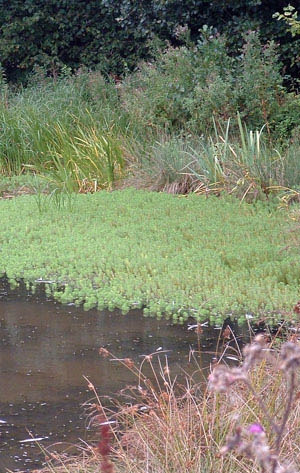Aquatic Invaders

Plantlife Scotland launches retail survey to find out more.
Some of Scotland’s most well-known lochs and rivers - including Loch Lomond and parts of the Tweed, Forth, Clyde and Spey river catchments – are already playing host to non-native invasive plants which may threaten Scotland’s native wildlife. Other areas affected include Linlithgow Loch, Spynie Loch and areas close to Loch Tay and Loch Ness.
"With some of our most iconic lochs and river catchments already affected by these plant invaders, it is a problem to be taken seriously," said Plantlife Scotland’s Su Cooper. "More than 60% of Scotland’s non-native plant species get into the wild by escaping from gardens and garden ponds. With the right information and by taking action, members of the public can help to reduce the problems caused by the most invasive species."
Plantlife Scotland is this week launching a survey asking the public to help gather information from garden centres, pet shops and other outlets selling aquatic plants, to find out which plants are on sale and how they are labelled, as part of a campaign to help solve the problem.
"We need responses from across Scotland to help build up a picture of which aquatic plants are on sale in different retail outlets, so we hope as many people as possible will phone us for a survey card," said Su Cooper. "Once Plantlife has information from across the country, we will be able to work together more effectively with our garden centre partners to find and supply pond plants that do not damage Scotland’s wildlife."
Plantlife also aims to offer improved guidance to encourage retail outlets to provide customers with the information they need to make the right choices when buying plants, and increase the range of native species on sale. The survey is part of Plantlife’s campaign ‘Pond Alert!’ which highlights the problem of non-native invasive aquatic plants threatening Scotland’s native flora and wildlife.
Reducing the number of plants escaping into the wild from our gardens would also help to reduce the huge costs of removing the most invasive plants. A Plantlife report on non-native species estimated that more than £3 million was needed to control New Zealand Pigmyweed alone.
To get involved with the survey, phone Plantlife Scotland on 01786 479382 for a ‘Quest for Aquatics’ survey card, e-mail Scotland@plantlife.org.uk or download a form from www.plantlife.org.uk/uk/plantlife-scotland-get-involved.html. Take the survey card to your local garden centre, pet shop or aquarist and fill in the questions by looking at the plants and their labels and talking to shop staff. It only takes a few minutes.